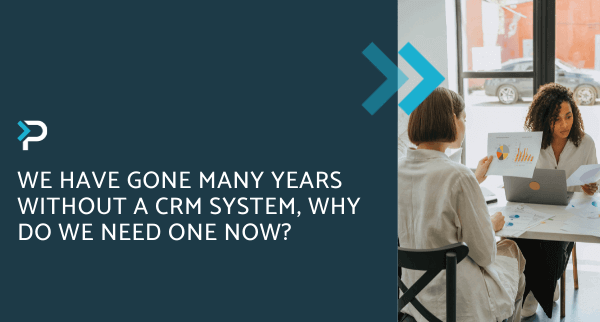We hear about a lot of Microsoft Dynamics 365 implementations failing and have subsequently helped many businesses rescue their failing CRM project and helped get them back on track. However, its important businesses are able to identify if their Dynamics / CRM project is failing and how they can avoid these pitfalls. In this article, we share the most common reasons for CRM failure and how we can help rescue your failing project.
Poor User Adoption
We have written a whole blog post on user adoption as this is one of the most common hurdles for businesses to overcome and a large contributor to project failure. This is really an outcome of many other things; lack of clear benefits communicated with employees, insufficient training, overcomplicated technology… the list goes on. However, when your users begin to work outside the CRM and revert to their previous habits, your CRM project is in danger of failure.
Viewing the CRM as just a Technology Solution
Viewing the technology as the complete answer is a major pitfall in a Dynamics project. The technology is really just the vehicle and the enabler and before that can become effective it’s important to understand what are your current processes, what is working well and what isn’t and what the future looks like in an ideal world. Defining that must come first, as part of the scoping and requirements gathering phase of the project. From there a fit-for-purpose solution can be designed and then after that, user adoption, user training and driving change management is absolutely key.
An Unsuccessful Partnership
When it comes to choosing the product and partner to implement your chosen solution, research is key. A common mistake is to choose a solution because it is familiar; either you’ve worked with it in the past or someone you know has worked with it. But, remember all business needs and requirements are individual, so it is critical you consider all options.
If, like Microsoft Dynamics 365, the technology is implemented by a partner then take your time to review partners out there – look at reviews, case studies, social media, meet with them, etc. We have come across multiple businesses who have implemented Dynamics and say “Microsoft Dynamics 365 isn’t right for our business”, yet when we have delved deeper, it isn’t that Dynamics is not right, it’s the customisations that have been built on top of the platform by the partner, which are failing to meet the needs of the customer. A good partner will understand your business challenges, processes & goals, and design the system around this.
No Plan for the Future
When designing your CRM solution, it is easy to get caught up in the ‘now’ – what do you need currently, what are your current business goals, etc. Whilst this information is obviously needed and very important, don’t lose sight of the future and consider what your future requirements may be.
It is rare that business needs and requirements remain the same for a long period of time, so scoping out what you might need as your business evolves, will mean you have a system that is fit for your business needs today, and in the future. If you have implemented a plug-and-play solution, this will be trickier to fit around your future requirements.
A Bespoke CRM Solution can be customised over time, with additional functionality being built as required.
Lack of post-implementation support
We often see the approach of “The project is complete once the technology has been implemented”. Here at Pragmatiq, we see the real project started after the technology has been implemented, as this is where businesses often faces challenges, but also realise the true value of the solution. It can be easy to think that after training has been delivered and the system has gone live, things will be plain sailing, but this is often not the case. Users will be getting used to new technology, adapting and learning new processes, and potentially overcoming their previous misconceptions about CRM software. For these reasons, it is critical that the communication is open between the partner and client and that there is an understanding of the potential pitfalls and how to overcome these.
Get in Touch
You may be reading this and recognise that your Microsoft Dynamics 365 / CRM project or implemented system hasn’t gone to plan and you are looking for additional support.
We have a team of Microsoft Dynamics 365 experts on hand to discuss your challenges and how we may be able to assist. Please get in touch by emailing us at info@pragmatiq.co.uk or calling us on 01908 038110. Alternatively, request a callback using the contact form.
Want to keep in touch?
Sign up to our newsletter for regular updates.
"*" indicates required fields

